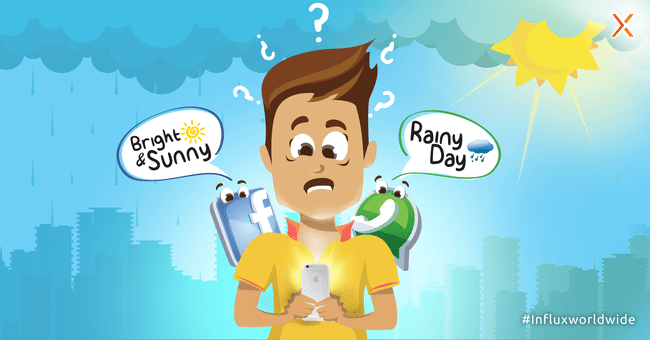The Chennai Rains Mania on Social Media — Fact or Fiction?
Daniel Anandaraj Garnipudi - @dodosamuel
In the aftermath of the rains that lashed the city and its environs, I have been thinking how easily rumours of cyclones, floods and other dire consequences spread. In the past week and more, I received numerous calls and texts from office colleagues regarding the status of the rains and began pondering on the best way for people to know what the real situation possible flooding and water-logging is.
What really does not help is the fact that social media — whilst having many positives as evidenced by the way the city of Chennai rallied together during the “great floods” in December 2015 — also has significant negatives.
I don’t know what it is with rumour mongers. What do they actually seek to gain from spreading false rumours? I agree; many a time social media is a great platform for sharing true information and connecting with people. But, perhaps it is equally true that a lot of what is posted there is false?
So the question then arises – how do we differentiate between the truth, and the lies and rumours?
Here’s what I try to do to seek the truth.
Witness verification
Check with the source that sent you the information. Did they actually witness it or is it a forward. If they have witnessed it, and if you consider them to be trustworthy, then, yes, believe it.
Backward verification
If they are not sure themselves, ask them to verify from their source. This will create a backwards verification chain and if you manage to reach the source through this process, then the information is most likely true. Believe it.
Active denial
If you are in the vicinity of the alleged information, and if you can verify the genuity of it, do so and actively refute tall and false claims where possible. For example, I got a message saying T Nagar was flooded! Err… I drove through the area that very day and the roads were clear and fine. I immediately posted back on the group that I got the message from and denied that claim.
#verified
Don’t believe #verified any more. This hashtag trended a while ago and whilst it was a good measure at that point in time, it is no longer a great method anymore, considering it is very easy to type it in at the end of any message. #verified.
#notverified
Then, this became a trending hashtag as well. My point is: such information must be disregarded completely. Further, if it is not verified, then why are you sending it on? Are you not, therefore, adding to the rumour-mongering and aiding in spreading the rumours too? Why be a part of something knowing full well that the power of social media is such that one day it will come back and bite you in the behind?
So, what is the best way for Chennai to handle this?
Chennai Weather
There is a weather blogger called Tamil Nadu Weatherman on Facebook. He has proven to be fairly accurate over the past couple of years in his predictions on weather. He is, by definition, a non-professional weather blogger. However, he does have a good track record of accurate predictions based on sound logic and data. Believe him if you must, or take his advice, but always remember – predicting weather is sometimes unpredictable, so be careful.
Other weather pages to follow are Chennai Floods and Chennai Rains.
Risk Map
I recently came across this tool and seeing the supporters it has garnered, I believe it to be a good one to generally gauge the weather sentiment across the city. This can be a powerful tool but only time will tell. For now, it is a good way to get a bird’s eye view.
The other solution
Actually, believe it or not, the solution still is Social Media!
Thinking about the the points I have made above, it made me ponder on what the best solution would be, and then I realised that it actually is the government that can help us the most. They are the ones who actually have people on the ground in terms of government offices, police stations, post offices, hospitals, etc.
My friends in Bangalore have always appreciated how the traffic cops there use WhatsApp for a lot for their messaging. They are also active and very followed on Facebook and Twitter as well. Chennai too should do this. I know Chennai Traffic Police have a Twitter handle, but I don’t think it is being used as actively as it can be. That is the change that needs to happen.
Summing up
Firstly, following someone in authority implies that the messages we get are accurate and verified. Most importantly, it shows that the government is in control and taking active steps to alleviate the problems of the common citizens.
Daniel is our Chief Operating Officer and a true-blue biking aficionado. With a background of over sixteen years’ experience, he runs a tight ship here at Influx, ensuring that we deliver projects on time, in scope, and of exceptional quality. That’s why we have happy and satisfied clients.
